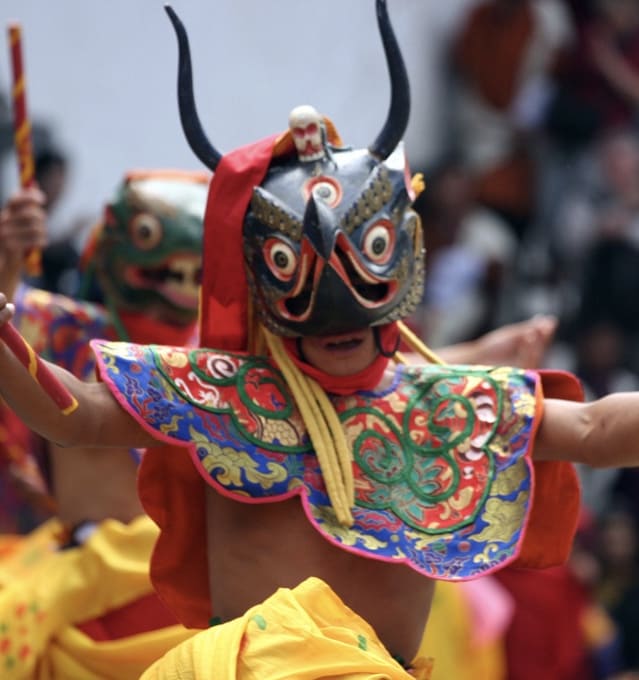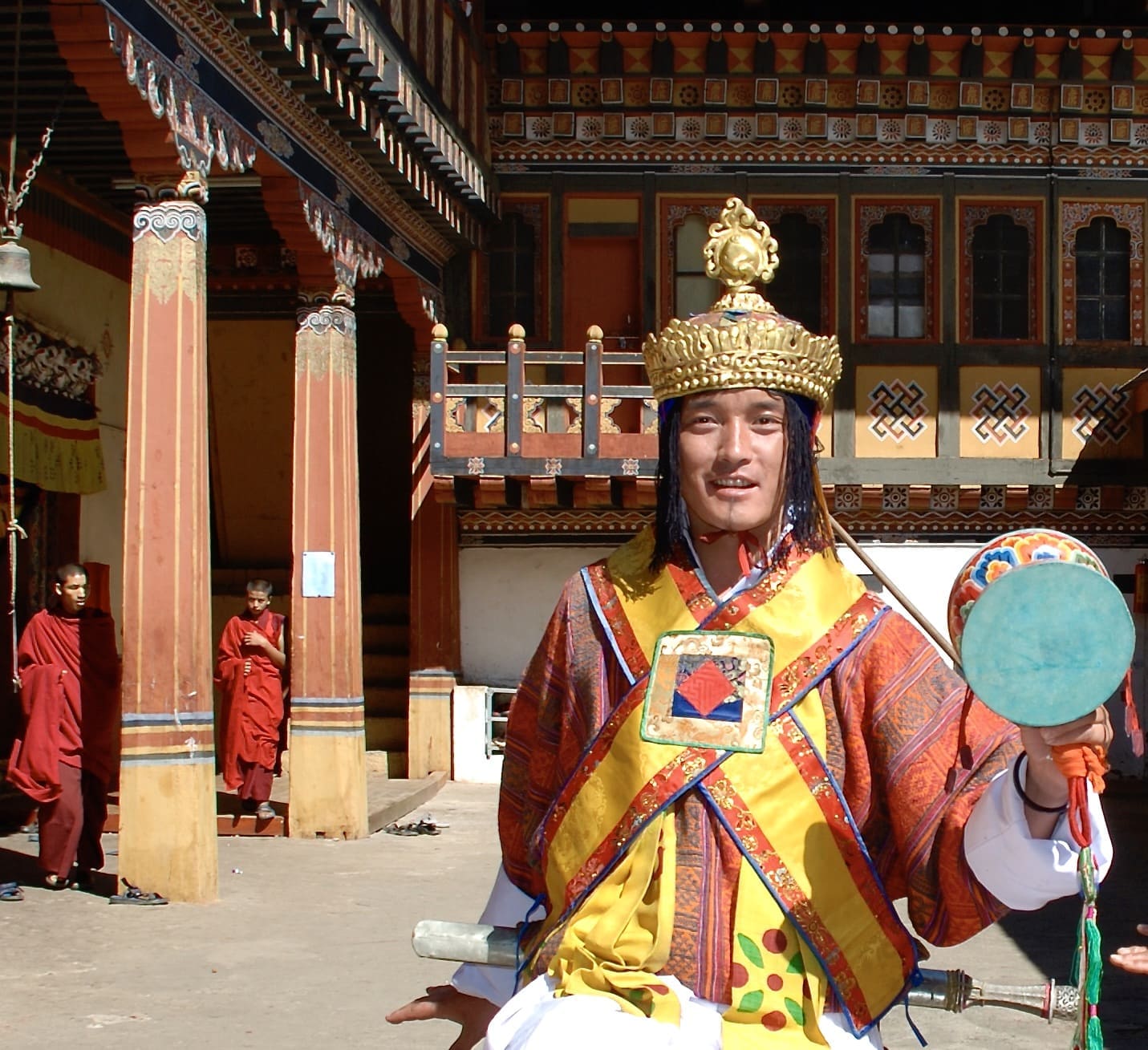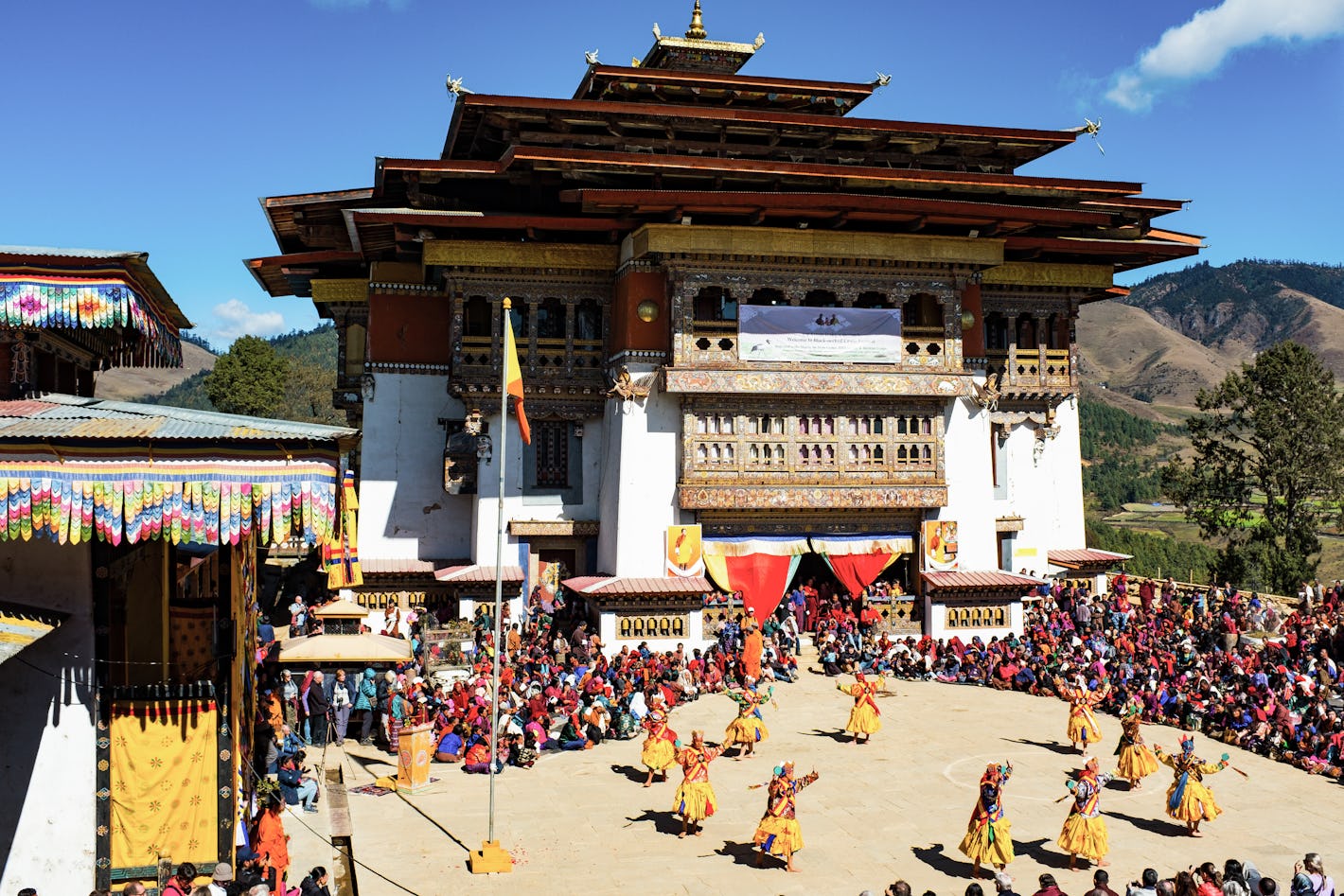You can contact us by e-mail or phone
from uk
01405 862917
outside uk
+44 1405 862917
01405 862917
+44 1405 862917
Land of the Thunder Dragon
All Meals Included
Duration
Accommodation
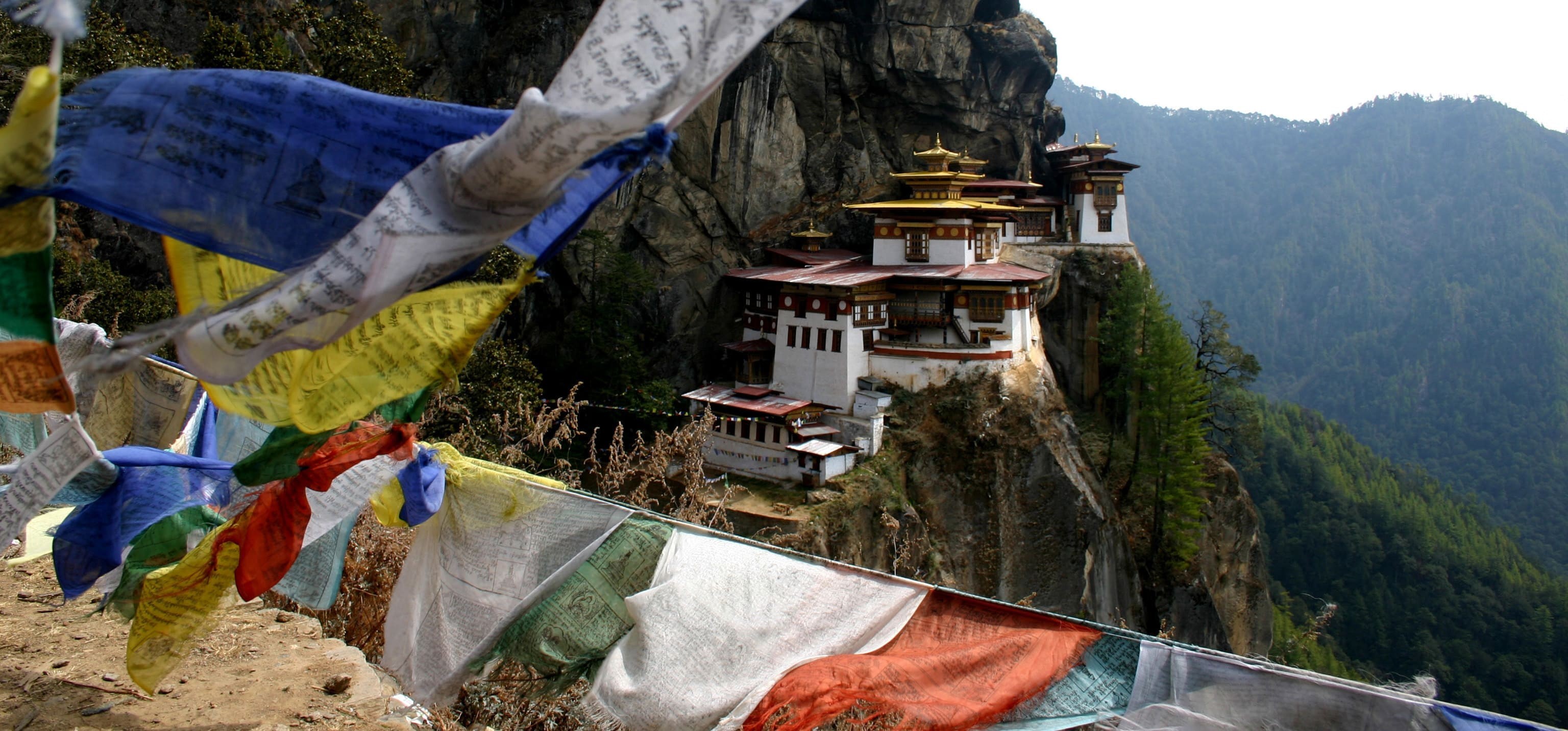
Trip Overview
A short Bhutan tour featuring the major cultural highlights of amazing Bhutan including the Tiger’s Nest and more .
This cultural adventure begins by exploring the delightful Paro Valley before heading to the capital city of Bhutan, Thimphu. After exploring both urban and rural Thimphu you then head further east on a spectacular road that leads up to the Dochu La, which is renowned for its breathtaking panoramic views of the Bhutan Himalayas.
From here you then descend into the verdant and lush Punakha Valley, which naturally includes a visit to the magnificent Punakha Dzong.
From Punakha you now head west and about as far as is possible to go and into the once “off limit’s” Haa Valley and which could be considered as getting “off the beaten track”.
Returning to Paro, there is of course the hike up to the famous Taktsang Monastery, more often referred to as the Tiger’s Nest and arguably the most iconic site in Bhutan to round off this tour nicely.
To afford you as many authentic Bhutanese experiences we have carefully selected a variety of accommodations. You can find out more about each accommodation simply by clicking their respective links in the detailed itinerary. However as part of your custom visit to Bhutan you can of course choose to upgrade or downgrade. For more see our full range of Bhutan Hotels in all locations.
A highlight of a visit to any country is of course its traditional cuisine and you’ll see for yourself in the detailed itinerary you’ll have many opportunities to sample Bhutanese food, from restaurants to home cooking.
A short Bhutan tour featuring the major cultural highlights of amazing Bhutan including the Tiger’s Nest and more .
-
This cultural adventure begins by exploring the delightful Paro Valley before heading to the capital city of Bhutan, Thimphu. After exploring both urban and rural Thimphu you then head further east on a spectacular road that leads up to the Dochu La, which is renowned for its breathtaking panoramic views of the Bhutan Himalayas.
From here you then descend into the verdant and lush Punakha Valley, which naturally includes a visit to the magnificent Punakha Dzong.
From Punakha you now head west and about as far as is possible to go and into the once “off limit’s” Haa Valley and which could be considered as getting “off the beaten track”.
Returning to Paro, there is of course the hike up to the famous Taktsang Monastery, more often referred to as the Tiger’s Nest and arguably the most iconic site in Bhutan to round off this tour nicely.
To afford you as many authentic Bhutanese experiences we have carefully selected a variety of accommodations. You can find out more about each accommodation simply by clicking their respective links in the detailed itinerary. However as part of your custom visit to Bhutan you can of course choose to upgrade or downgrade. For more see our full range of Bhutan Hotels in all locations.
A highlight of a visit to any country is of course its traditional cuisine and you’ll see for yourself in the detailed itinerary you’ll have many opportunities to sample Bhutanese food, from restaurants to home cooking.
Example Itinerary
-
-
Day 1Arrive Paro. Transfer to Paro Hotel.
-
Day 2Paro Sightseeing and to Thimphu
-
Day 3Thimpu and Cheri Gompa
-
Day 4Over the Dochu La to Punakha
-
Day 5Punakha Valley & Punakha Dzong
-
Day 6Across the Chele La to Haa
-
Day 7Dzong Drakha & Taktsang Monastery - Option to add 2 day Bumdra Trek to Taktsang.
-
Day 8Depart Paro
-
-
DAY
1Arrive Paro. Transfer to Paro Hotel.
Arrive at Paro Airport. You’ll be met upon arrival and transferred by private vehicle to your hotel in the Paro Valley. Depending on your arrival time, you may be able to enjoy a short sightseeing tour of Paro. This evening you’ll have your first opportunity to sample Bhutanese food and you’ll be taken to a family run restaurant in Paro renowned for its cooking.
Throughout this tour we have intentionally selected places to stay that are quite varied in their nature. You can find out more about each accommodation simply by clicking the respective links. However as part of your custom visit to Bhutan you can of course choose to upgrade or downgrade. For more see our full range of Bhutan Hotels in all locations. There’s everything from chic 5 star Boutique Hotels to wonderful home and farm stay experiences to choose from.
Accommodation: Naksel Boutique Hotel,Paro
Meals: DinnerDAY 1
Arrive Paro. Transfer to Paro Hotel.
Arrive at Paro Airport. You’ll be met upon arrival and transferred by private vehicle to your hotel in the Paro Valley. Depending on your arrival time, you may be able to enjoy a short sightseeing tour of Paro. This evening you’ll have your first opportunity to sample Bhutanese food and you’ll be taken to a family run restaurant in Paro renowned for its cooking.
Throughout this tour we have intentionally selected places to stay that are quite varied in their nature. You can find out more about each accommodation simply by clicking the respective links. However as part of your custom visit to Bhutan you can of course choose to upgrade or downgrade. For more see our full range of Bhutan Hotels in all locations. There’s everything from chic 5 star Boutique Hotels to wonderful home and farm stay experiences to choose from.
Accommodation: Naksel Boutique Hotel,Paro
Meals: DinnerDAY
2Paro Sightseeing and to Thimphu
Before leaving the beautiful Paro Valley you’ll visit Paro Dzong and the National Museum. You’ll then be driven to Thimphu (approximately 2 hours by private vehicle), stopping along the way to visit the Tamchog Lhakhang Temple. From the road, it’s an easy walk of around 15 minutes to reach this 14th-century temple. It’s very atmospheric, and you may be forgiven for feeling like you’ve just travelled back in time to mediaeval Bhutan. For lunch you’ll be taken to the Kalden restaurant in Thimphu, which is a firm favourite for the local inhabitants of Thimphu. You can expect many traditional Bhutanese dishes to be on the menu, alongside some delicacies too, which may perhaps be a little “unusual” for visitors and for the more adventurous palettes. After lunch you’ll be driven up to the giant Buddha statue, from where there are great views over Bhutan’s rather small capital city. If you haven’t already noticed, the phallus symbol in Bhutan is quite significant and is often seen on homes throughout Bhutan and intended to drive away the evil eye and malicious gossip. So, dinner tonight is at a restaurant in Thimphu called Phallus. You could say that it’s a phallus themed wonderland! The wooden cutlery alone may surprise you. The menu however is a mix of both international and Bhutanese dishes.
Accommodation: Namgay Heritage Hotel, Thimphu
Meals: Breakfast, Lunch, DinnerDAY 2
Paro Sightseeing and to Thimphu
Before leaving the beautiful Paro Valley you’ll visit Paro Dzong and the National Museum. You’ll then be driven to Thimphu (approximately 2 hours by private vehicle), stopping along the way to visit the Tamchog Lhakhang Temple. From the road, it’s an easy walk of around 15 minutes to reach this 14th-century temple. It’s very atmospheric, and you may be forgiven for feeling like you’ve just travelled back in time to mediaeval Bhutan. For lunch you’ll be taken to the Kalden restaurant in Thimphu, which is a firm favourite for the local inhabitants of Thimphu. You can expect many traditional Bhutanese dishes to be on the menu, alongside some delicacies too, which may perhaps be a little “unusual” for visitors and for the more adventurous palettes. After lunch you’ll be driven up to the giant Buddha statue, from where there are great views over Bhutan’s rather small capital city. If you haven’t already noticed, the phallus symbol in Bhutan is quite significant and is often seen on homes throughout Bhutan and intended to drive away the evil eye and malicious gossip. So, dinner tonight is at a restaurant in Thimphu called Phallus. You could say that it’s a phallus themed wonderland! The wooden cutlery alone may surprise you. The menu however is a mix of both international and Bhutanese dishes.
Accommodation: Namgay Heritage Hotel, Thimphu
Meals: Breakfast, Lunch, DinnerDAY
3Thimpu and Cheri Gompa
The morning is spent exploring Thimphu with your guide. Firstly, you’ll pay a visit to the Tashichho Dzong and other places of interest, depending on your preferences. Possibilities include the School of Painting, craft workshops, the late King’s Memorial, and the Handicrafts Emporium. The latter is perhaps the best place in Bhutan to purchase Bhutanese handicrafts. One alternative would be to pay a visit to the Takin Reserve, a rather weird animal native to Bhutan if the hike to Cheri Gompa isn’t to your taste. If it is then you’ll be driven a short distance from Thimphu to Begana to enjoy a beautiful afternoon walk up to Cheri Gompa. This is such a scenic walk and therefore it’s an idyllic opportunity to enjoy a picnic lunch along the way amongst natural surroundings.The Gompa was built in the 17th Century, high up on a hill surrounded by forested hills. It takes around an hour to walk up to the Gompa and there are a few different detour possibilities for the return in order that you can walk through and experience the rural aspects of Bhutanese life. Walking time is around 3-4 hours. This evening you’ll be able to enjoy dinner in a different Bhutanese restaurant in Thimphu.
Accommodation: Namgay Heritage Hotel, Thimphu
Meals: Breakfast, Lunch, DinnerDAY 3
Thimpu and Cheri Gompa
The morning is spent exploring Thimphu with your guide. Firstly, you’ll pay a visit to the Tashichho Dzong and other places of interest, depending on your preferences. Possibilities include the School of Painting, craft workshops, the late King’s Memorial, and the Handicrafts Emporium. The latter is perhaps the best place in Bhutan to purchase Bhutanese handicrafts. One alternative would be to pay a visit to the Takin Reserve, a rather weird animal native to Bhutan if the hike to Cheri Gompa isn’t to your taste. If it is then you’ll be driven a short distance from Thimphu to Begana to enjoy a beautiful afternoon walk up to Cheri Gompa. This is such a scenic walk and therefore it’s an idyllic opportunity to enjoy a picnic lunch along the way amongst natural surroundings.The Gompa was built in the 17th Century, high up on a hill surrounded by forested hills. It takes around an hour to walk up to the Gompa and there are a few different detour possibilities for the return in order that you can walk through and experience the rural aspects of Bhutanese life. Walking time is around 3-4 hours. This evening you’ll be able to enjoy dinner in a different Bhutanese restaurant in Thimphu.
Accommodation: Namgay Heritage Hotel, Thimphu
Meals: Breakfast, Lunch, DinnerDAY
4Over the Dochu La to Punakha
To reach Punakha, the former capital of Bhutan, it takes around 3 hours by road in a private vehicle. But, it’s a spectacular journey over the Dochu La. The pass itself is at an altitude of 3140 m, and if it’s a clear day, you can look forward to spectacular views of the distant peaks of the Himalayas. Actually, this is a good place to stop and enjoy a leisurely lunch at a restaurant at the Dochu La itself and gaze at Bhutan’s highest peak, the unclimbed Gangkar Puensum (7550m). As you drop down into the Punakha Valley, you’ll notice how verdant everything is fast becoming. Stopping along the way, you’ll visit the “Divine Madman’s Temple”, otherwise known as Chimi Lhakhang. It is rather popular with Bhutanese women, and it won’t escape your notice that this 15th-century temple is decorated with phallus symbols. The women are coming here to pray for having children, although Drukpa Kunley, who built the 15th-century temple, did have some rather eccentric views about sex and is revered to this day by the Bhutanese people. Drukpa Kunley believed that sexual freedom lay at the centre of “The Truth” in his Tantric teachings. Welcome to Bhutan!
Now for what we hope you’ll consider a real treat and a genuinely authentic cultural experience.
To reflect the rurality of the achingly beautiful and lush Punakha Valley as well as afford you the opportunity to become more immersed and understanding of real life in Bhutan we’ve selected a very special Farmhouse cum Home Stay. Hostess Aum Karma has converted the family farm house into a very welcoming, rustic place for visitors to enjoy. Restaurant food is one thing, but you can’t beat proper home cooking and that is exactly what Aum Karma will do and prepare delicious, traditional Bhutanese food for you.
However you can readily change this accommodation and upgrade from our selection of Punakha Hotels if you prefer.Accommodation: Happiness Field Farmhouse, Punakha
Meals: Breakfast, Lunch, DinnerDAY 4
Over the Dochu La to Punakha
To reach Punakha, the former capital of Bhutan, it takes around 3 hours by road in a private vehicle. But, it’s a spectacular journey over the Dochu La. The pass itself is at an altitude of 3140 m, and if it’s a clear day, you can look forward to spectacular views of the distant peaks of the Himalayas. Actually, this is a good place to stop and enjoy a leisurely lunch at a restaurant at the Dochu La itself and gaze at Bhutan’s highest peak, the unclimbed Gangkar Puensum (7550m). As you drop down into the Punakha Valley, you’ll notice how verdant everything is fast becoming. Stopping along the way, you’ll visit the “Divine Madman’s Temple”, otherwise known as Chimi Lhakhang. It is rather popular with Bhutanese women, and it won’t escape your notice that this 15th-century temple is decorated with phallus symbols. The women are coming here to pray for having children, although Drukpa Kunley, who built the 15th-century temple, did have some rather eccentric views about sex and is revered to this day by the Bhutanese people. Drukpa Kunley believed that sexual freedom lay at the centre of “The Truth” in his Tantric teachings. Welcome to Bhutan!
Now for what we hope you’ll consider a real treat and a genuinely authentic cultural experience.
To reflect the rurality of the achingly beautiful and lush Punakha Valley as well as afford you the opportunity to become more immersed and understanding of real life in Bhutan we’ve selected a very special Farmhouse cum Home Stay. Hostess Aum Karma has converted the family farm house into a very welcoming, rustic place for visitors to enjoy. Restaurant food is one thing, but you can’t beat proper home cooking and that is exactly what Aum Karma will do and prepare delicious, traditional Bhutanese food for you.
However you can readily change this accommodation and upgrade from our selection of Punakha Hotels if you prefer.Accommodation: Happiness Field Farmhouse, Punakha
Meals: Breakfast, Lunch, DinnerDAY
5Punakha Valley & Punakha Dzong
You’re probably keen to visit Punakha Dzong, but first there’s a very atmospheric walk to enjoy. In less than half an hour's drive into the Punakha Valley, you’ll alight and set off on foot to Khamsum Yuelley Namgyal Chorten. The walking is innocent enough to begin with as you cross the Mo Chu River by way of a suspension bridge and stroll through paddy fields. But, as you’ve probably now realised, many religious monuments are located in the hills, and this one is no exception. So, you then have to climb up to the chorten. It should take less than an hour to reach it, though, even if it is a steep ascent. After exploring the chorten, you can walk back down the way you came up and return to your vehicle to be driven to Punakha Dzong. But if you prefer to carry on walking, you can exit via a different gate, and after an initial steep descent, the trail contours the hillside to descend more gradually through woodland to the village of Yambesa. Reaching the river, it’s then a nice and easy downstream stroll as you walk all the way to Punakha Dzong. After admiring the Dzong you’ll be driven back to your accommodation. Total walking time for this option is around 3-4 hours.
A good place for lunch today is Kajathrom. This is an al fresco restaurant that is set within beautiful park land and also enjoys a riverside location.
As for dinner, well yet another opportunity to enjoy some more of Aum Karma’s tasty home cooking. If you wanted to try a traditional Bhutanese Hot Stone Bath before dinner, then let Aum Karma know after breakfast this morning and she can have one prepared for you for a small, additional payment.Accommodation: Happiness Field Farmhouse, Punakha
Meals: Breakfast, Lunch, DinnerDAY 5
Punakha Valley & Punakha Dzong
You’re probably keen to visit Punakha Dzong, but first there’s a very atmospheric walk to enjoy. In less than half an hour's drive into the Punakha Valley, you’ll alight and set off on foot to Khamsum Yuelley Namgyal Chorten. The walking is innocent enough to begin with as you cross the Mo Chu River by way of a suspension bridge and stroll through paddy fields. But, as you’ve probably now realised, many religious monuments are located in the hills, and this one is no exception. So, you then have to climb up to the chorten. It should take less than an hour to reach it, though, even if it is a steep ascent. After exploring the chorten, you can walk back down the way you came up and return to your vehicle to be driven to Punakha Dzong. But if you prefer to carry on walking, you can exit via a different gate, and after an initial steep descent, the trail contours the hillside to descend more gradually through woodland to the village of Yambesa. Reaching the river, it’s then a nice and easy downstream stroll as you walk all the way to Punakha Dzong. After admiring the Dzong you’ll be driven back to your accommodation. Total walking time for this option is around 3-4 hours.
A good place for lunch today is Kajathrom. This is an al fresco restaurant that is set within beautiful park land and also enjoys a riverside location.
As for dinner, well yet another opportunity to enjoy some more of Aum Karma’s tasty home cooking. If you wanted to try a traditional Bhutanese Hot Stone Bath before dinner, then let Aum Karma know after breakfast this morning and she can have one prepared for you for a small, additional payment.Accommodation: Happiness Field Farmhouse, Punakha
Meals: Breakfast, Lunch, DinnerDAY
6Across the Chele La to Haa
Time to now start heading west. Again by way of the Dochu La, which is probably the best location for a lunch stop on this journey too. But, you’re also going farther west than Paro and driving over the Chele La (3990m) and into the wonderful, rather “off the beaten track” Haa Valley. All in all, it’s around a 5-hour drive from Punakha, and once again, from both passes, you can pray for clear weather for those wonderful Himalayan views. Along the way you might want to stop and visit the Kila Gompa nunnery. You’ll have to walk, but it only takes around half an hour to reach. This rather isolated, peaceful Gompa with lush, forested slopes surrounding it is most certainly a place of peace and retreat. It’s home to around 30 or so nuns who live a life of seclusion and dedication to spirituality. Dating back as far as the 9th century, as a site of meditation, there are numerous secret caves as well as small buildings for secluded meditation. Descending into the “Once off limits” Haa Valley, you’ll notice the Rigsum—these are three hills, all cone-shaped, that are (believed to be) the physical manifestations of Manjushri, Chenrizig, and Chana Dorji. The Dalai Lama is considered to be Chenrizig in human form, the Buddha of compassion. Chana Dorji is the god that is believed to protect Bhutan. Once you’ve arrived at your atmospheric accommodation, your guide will take you on a gentle leg stretcher walk and to explore part of this beautiful valley. You may wish to consider spending an additional night here to give you another day to experience more of the Haa Valley.
Tonight you can enjoy staying at a genuine heritage lodge that is a traditional Bhutanese farmhouse that is around 150 years old, family-owned and has been restored and transformed into a charming authentic boutique lodge.
To make your visit to Haa even more special we’ll arrange for your dinner this evening to be at an authentic farmhouse where you can try a speciality that is equally authentic to the Haa Valley. Hoentay.
Hoentay is not dissimilar to the momo in so much as it's a stuffed dumpling, but in this instance made from buckwheat. The stuffing traditionally being turnip leaves, cheese and spices.
Just like momo's these are best enjoyed with Ezay, which is a chilli based sauced with the addition of Szechuan pepper for even more zing.
Hoentay isn’t an every day food for the people of Haa. Rather it’s usually prepared by the locals for auspicious occasions like religious festivals. But, what better place to try a dish that belongs to the Haa Valley in that very and most bucolic valley itself and with the added atmosphere of a genuine farmhouse too. It’s about as real as it gets.Accommodation: Soednam Zingkha Heritage Lodge, Haa Valley
Meals: Breakfast, Lunch, DinnerDAY 6
Across the Chele La to Haa
Time to now start heading west. Again by way of the Dochu La, which is probably the best location for a lunch stop on this journey too. But, you’re also going farther west than Paro and driving over the Chele La (3990m) and into the wonderful, rather “off the beaten track” Haa Valley. All in all, it’s around a 5-hour drive from Punakha, and once again, from both passes, you can pray for clear weather for those wonderful Himalayan views. Along the way you might want to stop and visit the Kila Gompa nunnery. You’ll have to walk, but it only takes around half an hour to reach. This rather isolated, peaceful Gompa with lush, forested slopes surrounding it is most certainly a place of peace and retreat. It’s home to around 30 or so nuns who live a life of seclusion and dedication to spirituality. Dating back as far as the 9th century, as a site of meditation, there are numerous secret caves as well as small buildings for secluded meditation. Descending into the “Once off limits” Haa Valley, you’ll notice the Rigsum—these are three hills, all cone-shaped, that are (believed to be) the physical manifestations of Manjushri, Chenrizig, and Chana Dorji. The Dalai Lama is considered to be Chenrizig in human form, the Buddha of compassion. Chana Dorji is the god that is believed to protect Bhutan. Once you’ve arrived at your atmospheric accommodation, your guide will take you on a gentle leg stretcher walk and to explore part of this beautiful valley. You may wish to consider spending an additional night here to give you another day to experience more of the Haa Valley.
Tonight you can enjoy staying at a genuine heritage lodge that is a traditional Bhutanese farmhouse that is around 150 years old, family-owned and has been restored and transformed into a charming authentic boutique lodge.
To make your visit to Haa even more special we’ll arrange for your dinner this evening to be at an authentic farmhouse where you can try a speciality that is equally authentic to the Haa Valley. Hoentay.
Hoentay is not dissimilar to the momo in so much as it's a stuffed dumpling, but in this instance made from buckwheat. The stuffing traditionally being turnip leaves, cheese and spices.
Just like momo's these are best enjoyed with Ezay, which is a chilli based sauced with the addition of Szechuan pepper for even more zing.
Hoentay isn’t an every day food for the people of Haa. Rather it’s usually prepared by the locals for auspicious occasions like religious festivals. But, what better place to try a dish that belongs to the Haa Valley in that very and most bucolic valley itself and with the added atmosphere of a genuine farmhouse too. It’s about as real as it gets.Accommodation: Soednam Zingkha Heritage Lodge, Haa Valley
Meals: Breakfast, Lunch, DinnerDAY
7Dzong Drakha & Taktsang Monastery - Option to add 2 day Bumdra Trek to Taktsang.
Unless you’ve decided to spend a further day exploring the delights of the Haa Valley you’ll now be heading back over the Chele La to Paro. You’ll first stop and visit the Dzong Drakha. This is a stunning temple built as if it were part of a vertical cliff face, although it is actually constructed on a ledge. It’s certainly very impressive and also affords some rather splendid views. After taking lunch at a restaurant in Paro, you’re probably itching to visit the Tiger's Nest. It’s actually a stiff 2-hour walk up through woodland and although not sustained parts are a rather steep climb. Thankfully, there’s a teahouse at one of the classic Taktsang Monastery view points where you can rest and refresh before a further 30 minutes of climbing brings you to Taktsang (3110m) itself. On the final climb, you pass what is probably the most famous view point, which looks directly across to the monastery. It’s usually possible to enter the monastery, but if there’s something going on at the monastery (religious or VIP visit), then it may not be possible. Heading steeply down, a descent of around 100m leads into a gorge before climbing back up to the main monastery gate, from which it’s down to the valley floor and your ride “home”. Walking time is around 4–5 hours, with around 750m of ascent and descent.
Alternatively this can also be extended to become a 2 day trek known as the Bumdra Trek. This hike begins at Sang Choekor Monastery (2800m) near Paro followed by a steep climb of around 2hrs to a ridge and then to Chhoe Chhoe Tse Lhakhang and then up through pine forests to Bumdra Monastery (3800m) where you spend the night at fixed camp. Walking time is around 4hrs total with 1000m ascent. There’s also the option to climb Bumdra Peak (2-3hrs return and approx 4000m) for greater Himalayan views.
The following day you would trek from Bumdra to Taktsang Monastery , which takes around 3hrs and then descend on the main Taktsang trail and then transfer to your accommodation for the night and where you’ll also have dinner.
Tonight’s selected accommodation for your last evening in Bhutan is a rather atmospheric one under canvas in a deluxe tent, but still with the feel of a modern hotel bedroom. This is glamping Bhutanese style. However you can readily change this accommodation and upgrade/downgrade from our selection of Paro Hotels if you prefer.Accommodation: The Tiger's Nest Camp, Paro
Meals: Breakfast, Lunch, DinnerDAY 7
Dzong Drakha & Taktsang Monastery - Option to add 2 day Bumdra Trek to Taktsang.
Unless you’ve decided to spend a further day exploring the delights of the Haa Valley you’ll now be heading back over the Chele La to Paro. You’ll first stop and visit the Dzong Drakha. This is a stunning temple built as if it were part of a vertical cliff face, although it is actually constructed on a ledge. It’s certainly very impressive and also affords some rather splendid views. After taking lunch at a restaurant in Paro, you’re probably itching to visit the Tiger's Nest. It’s actually a stiff 2-hour walk up through woodland and although not sustained parts are a rather steep climb. Thankfully, there’s a teahouse at one of the classic Taktsang Monastery view points where you can rest and refresh before a further 30 minutes of climbing brings you to Taktsang (3110m) itself. On the final climb, you pass what is probably the most famous view point, which looks directly across to the monastery. It’s usually possible to enter the monastery, but if there’s something going on at the monastery (religious or VIP visit), then it may not be possible. Heading steeply down, a descent of around 100m leads into a gorge before climbing back up to the main monastery gate, from which it’s down to the valley floor and your ride “home”. Walking time is around 4–5 hours, with around 750m of ascent and descent.
Alternatively this can also be extended to become a 2 day trek known as the Bumdra Trek. This hike begins at Sang Choekor Monastery (2800m) near Paro followed by a steep climb of around 2hrs to a ridge and then to Chhoe Chhoe Tse Lhakhang and then up through pine forests to Bumdra Monastery (3800m) where you spend the night at fixed camp. Walking time is around 4hrs total with 1000m ascent. There’s also the option to climb Bumdra Peak (2-3hrs return and approx 4000m) for greater Himalayan views.
The following day you would trek from Bumdra to Taktsang Monastery , which takes around 3hrs and then descend on the main Taktsang trail and then transfer to your accommodation for the night and where you’ll also have dinner.
Tonight’s selected accommodation for your last evening in Bhutan is a rather atmospheric one under canvas in a deluxe tent, but still with the feel of a modern hotel bedroom. This is glamping Bhutanese style. However you can readily change this accommodation and upgrade/downgrade from our selection of Paro Hotels if you prefer.Accommodation: The Tiger's Nest Camp, Paro
Meals: Breakfast, Lunch, DinnerDAY
8Depart Paro
A private vehicle transfer to Paro Airport for your departing flight
Meals: Breakfast
Of course, there's no reason to depart today; your Bhutan holiday can be readily tailor made.
DAY 8
Depart Paro
A private vehicle transfer to Paro Airport for your departing flight
Meals: Breakfast
Of course, there's no reason to depart today; your Bhutan holiday can be readily tailor made.
IMPORTANT
This is an EXAMPLE ITINERARY and can be customised for you accordingly.
Please consider whether you want your customisable, private trip itinerary to also include CONTINGENCY.
See our ABOUT CONTINGENCY Information
Please CONTACT US to discuss CONTINGENCY and ADDITIONAL ACCLIMATISATION, as well as other CUSTOMISATION POSSIBILITES for your PRIVATE CUSTOM TREK
Price Guide
- $ US 2245
IMPORTANT INFO ABOUT OUR PRICE GUIDES
Prices include the compulsory Bhutan Sustainable Development Fee.
For more, see: BHUTAN TOURIST CHARGES EXPLAINED
What's included
The price shown is for guideline purposes. The price is inclusive of the DAILY SUSTAINABLE DEVELOPMENT FEE, all accommodations described in the detailed itinerary (twin share) - An English-speaking Bhutanese guide
Private airport transfers
All road transport by private vehicles
Accommodation as indicated
All meals as indicated
Bhutan Visa and Tourist Taxes
Bhutan airport tax
Sightseeing, where specified
Don't Forget
We can customise
all our trips.
extend. shorten. upgrade
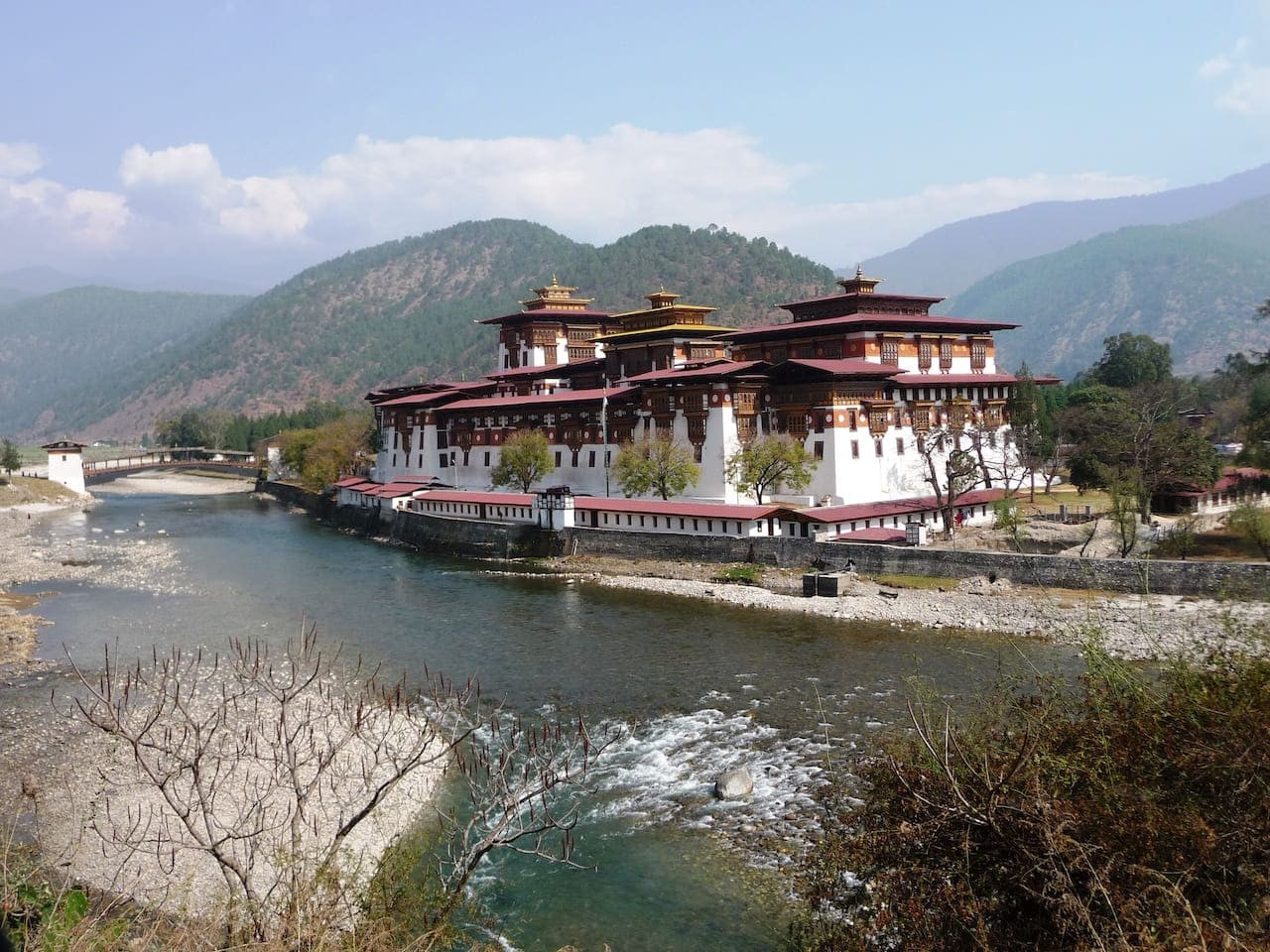
See an image gallery of sights, people, Dzongs, festivals and more of the wonders of beautiful Bhutan
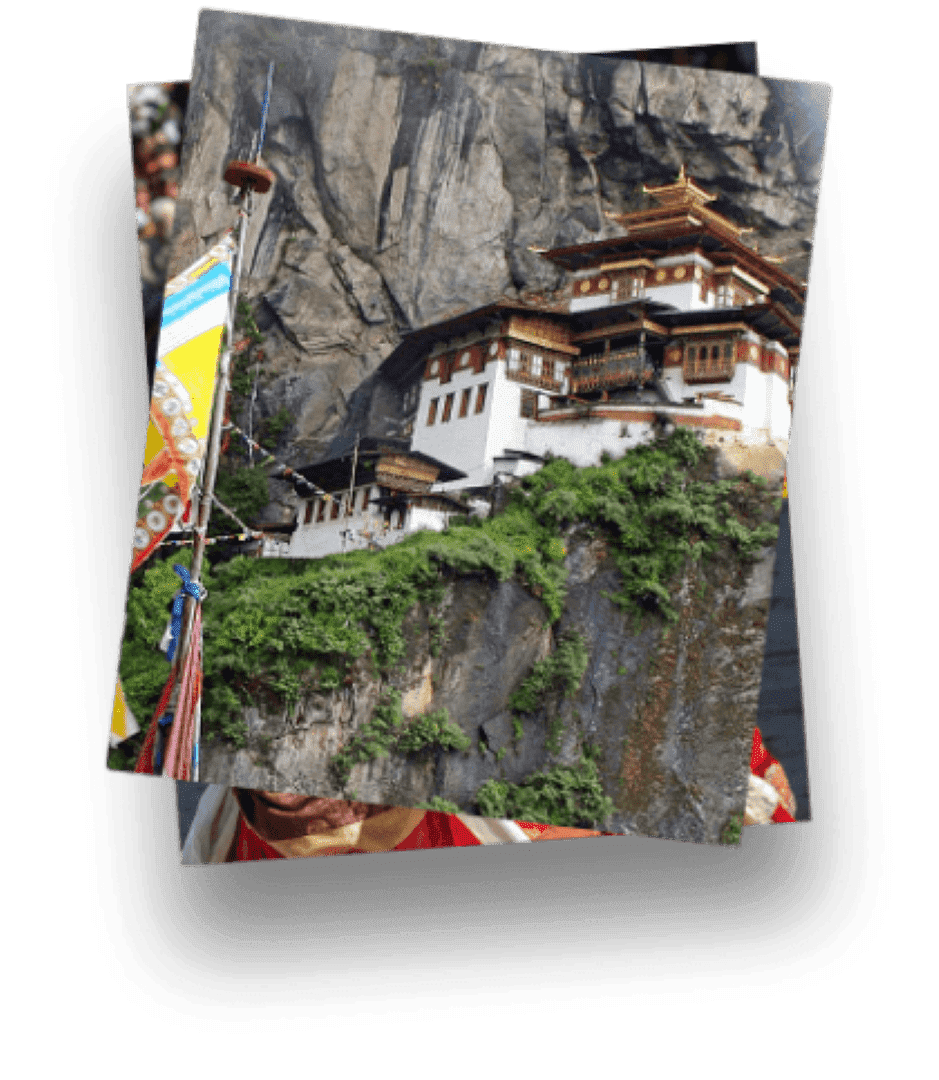
Read our Bhutan Travel Guide

All rights reserved. Snow Cat Travel is a Registered Trade Mark UK 00003289264

